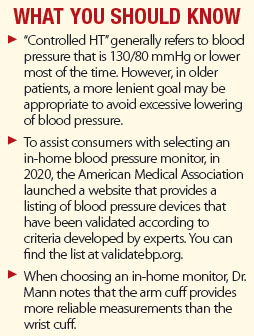Rising Hypertension Rates Prompt “Call to Action”
Are you one of the more than 100 million American adults who have hypertension (HT)? If you are, do you have it under control? If you answered, “Yes,” you’re one of about only 25 percent of the people with HT who do.
A “Call to Action”
In October 2020, the Office of the Surgeon General released a “call to action to control hypertension” in a report emphasizing the importance of improving our national blood pressure (BP) numbers.
The “call to action” is particularly timely in the age of COVID-19: Uncontrolled HT has been linked with a higher risk of complications from COVID-19. Our nation’s heightened focus on race issues is also relevant: Both COVID-19 and uncontrolled HT are more prevalent among black Americans than white Americans.
A renewed focus on better HT control is also important given recent research showing that control of HT has lagged in the United States in recent years.
“When HT is controlled, many cardiovascular events are prevented, so it’s regrettable to learn that the number of people who have their BP under control has decreased in recent years,” says Samuel Mann, MD, a hypertension expert at Weill Cornell Medicine.

In-Home Monitoring
The Surgeon General’s report recommends that patients monitor their BP at home.
According to Dr. Mann, “It’s extremely valuable for patients to measure their BP at home. If they are monitoring their BP correctly, the results are more likely to be accurate than readings taken in a doctor’s office. Patients who selfmonitor are more likely to take their medications, and they need to make fewer visits to their doctors.”
However, Dr. Mann notes that most people who are monitoring their BP at home are doing it incorrectly. Steps Dr. Mann suggests to improve the accuracy of in-home BP monitoring include:
- Sitting quietly for five minutes prior to taking a BP reading.
- Taking three readings consecutively, allowing about a minute between each reading.
- Not taking readings many times a day.
“Check your BP at different times of the day, but not in the same day,” advises Dr. Mann. “Taking multiple readings a day can affect your readings because you’re thinking about it too much.”
Keep a record of your readings and share them with your doctor; they will help your doctor determine if your current treatment regimen is effective and if any medication adjustments are needed.
Medication Choices
When selecting a medication, your doctor will consider a number of factors, including your age, weight, gender, race, lifestyle, medical history, and other health conditions you have.
“An important factor to consider is whether or not a patient has saltsensitive HT; if they do, a diuretic or calcium channel blocker is more effective than some other classes of drugs,” explains Dr. Mann. He notes that a majority of the population is salt-sensitive, meaning that consuming excess sodium increases their blood pressure. Older people tend to be more salt-sensitive than younger people, and blacks tend to be more salt-sensitive than whites.
You might think that the COVID- 19 pandemic would result in an overall increase in blood pressure numbers, but, in fact, Dr. Mann explains that, not infrequently, it’s just the opposite: “I’ve seen many patients with lower blood pressure numbers in the COVID era. Why? People are eating at home more, so they are consuming less salt. In fact, patients who reduce their salt intake may need to reduce their medications, particularly if they are taking a diuretic.”
The cause of HT is another significant factor. “In most cases, HT is driven by mechanisms originating in the kidneys.
In some, HT is linked to sympathetic nervous system activity, or to both of thse mechanisms,” explains Dr. Mann. “Once it’s determined what is driving the HT, we can then select the medications that target the cause.”
For detailed information about medications, you may want to consult Hypertension and You: Old Drugs, New Drugs, and the Right Drugs for Your High Blood Pressure, a book written by Dr. Mann that is available on Amazon.
Medications Need to Be Individualized for Each Patient
Unfortunately, many patients aren’t put on the medication regimens that would help them achieve the best HT control.
“Medications are not being used to the best advantage for a number of reasons,” says Dr. Mann.
“The general guidelines are developed for treating the average patient, but a HT specialist knows that patients differ from one another and need different treatment approaches. Individualization of drug selection is key for successful outcomes.
“Sometimes, there’s a disconnect between which are the best medications and which medications are most often prescribed. Many older medications are excellent, but they are widely overlooked because they either were not marketed well or were not respresented in the large trials that have been conducted.”
Another reason for the high percentage of uncontrolled HT is that many doctors don’t have in-depth knowledge about blood pressure medications, explains Dr. Mann. “There are about 75 blood pressure drugs available, and there are a lot of subtleties to consider when choosing a regimen for a specific patient.”
Patient Participation
Hypertension has always been a difficult condition to get patients to take seriously, since there are usually no symptoms, but Dr. Mann encourages everyone with HT to play an active role in their treatment.
“Do not settle for living with side effects or inadequately controlled HT,” advises Dr. Mann. “Patients taking medications that have side effects or are not controlling their HT need a change in their medication or referral to a physician that has more expertise in treating HT. Often, there is some trial and error to find the right medications, but once you get the regimen that works, it tends to work for years.”
The post Rising Hypertension Rates Prompt “Call to Action” appeared first on University Health News.
Read Original Article: Rising Hypertension Rates Prompt “Call to Action” »

